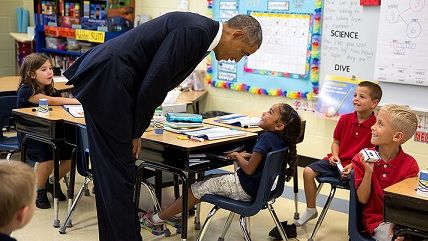With Discipline as With So Much Else in Education, Choice Is the Answer
Forget the national debate over zero tolerance vs. reform; let families pick what works for them.

"It is absolute chaos," former teacher Jasmine Kettler wrote on her blog in the wake of student discipline reforms in western Washington's Highline School District. Voicing a sentiment endorsed by some other local educators, she added, "students feel unsafe at school. I felt unsafe at school. Fighting, harassment, and incited aggression are present during passing periods, after school, and at-lunch."
Ketter wasn't alone when she quit. This summer, three years after the school district that until recently employed her eased punitive sanctions and opted for more in-school suspensions over booting kids out, more than 200 teachers resigned. Many of them signed a letter pointing to the discipline changes as their reason for leaving.
What's interesting is that the eased discipline policies driving the Highline resignations are themselves being adopted around the country in response to years of complaints about zero tolerance policies and rigid discipline. Parents and students have increasingly protested harsh penalties for kids "guilty" of throwing snowballs, failing to carry ID, and keeping a pocket knife in a car parked on campus. Their experiences made them no happier than Kettler was with hers.
It's almost as if one-size-fits-all discipline policies applied across the board to different students in diverse circumstances are as bad an idea as inflicting cookie-cutter curricula and teaching styles on kids with widely varying interests and talents.
The Highline School District controversy comes in the midst of a national debate over appropriate discipline policies in schools. Educators, administrators, policy makers, and families can't quite agree on the proper balance between maintaining order in schools and allowing kids to be kids without fear of an officially sanctioned stomping. Everybody has an opinion, and a litany of stories to tell to support their position.
"Research and data on school discipline practices are clear," The School Discipline Consensus Report, published by the Council of State Governments Justice Center, announced in 2014. "Millions of students are being removed from their classrooms each year, mostly in middle and high schools, and overwhelmingly for minor misconduct. When suspended, these students are at a significantly higher risk of falling behind academically, dropping out of school, and coming into contact with the juvenile justice system."
"Coming into contact with the juvenile justice system" is what the National Education Association [NEA] and others call the "school-to-prison pipeline" with reference to the higher crime rates prevailing among young people who don't earn high school diplomas. "In 2010, more than 3 million students were suspended from school, or double the level of suspensions in the 1970s," noted neaToday. "Meanwhile, more than a quarter-million were 'referred' to police officers for misdemeanor tickets, very often for offenses that once would have elicited a stern talking-to."
But Kettler and company weren't just talking about minor pranks. A few months before their resignations hit the news, the Seattle Times reported that "kids from Highline are packing the roster of murder-case prosecutions." None of the crimes occurred on campus, and district officials said kids were removed from class if they were arrested for breaking the law. But they obviously had their hands full.
So, which is it? Are school discipline policies too lenient? Or are they too harsh?
Maybe the answer is a bit of both – and, more importantly, that discipline policies don't seem to be applied with any reference to judgment or good sense.
In her widely circulated blog post, Kettler complained that teacher reports of misbehavior were often buried or modified by administrators to shield students from consequences. She cited the case of a student who was sent back to gym class despite violent outbursts and reports that she was dangerous; she ultimately beat and badly injured a classmate. But contrast that with the autistic 11-year-old boy charged by Virginia authorities with felony assault after struggling against a school resource officer who grabbed him. Or the Florida 7th-grader who was arrested and charged with misdemeanor battery after bopping a buddy with a Tootsie Pop. Then there's the Georgia high school senior who faced felony charges because the tackle box in his car contained knives.
There's plenty of stupid to go around in public schools with the application of all flavors of discipline policies. The commonality here isn't lenience or rigidity—it's the government-run monopoly that still prevails for many Americans, despite growing options.
Advocates of educational choice have long argued that families are best served when they can pick among educational approaches. The idea is that some kids learn best when they pursue their own interests at their own pace, while others thrive in a structured environment. Some kids take in information best from lectures, while others soak up knowledge from the printed page. Solitary learners need one setting, and others do well in groups.
The number of children who are homeschooled in various ways and attending any number of different kinds of charter schools has grown by leaps and bounds in recent years, suggesting a large constituency for choices. That's no surprise since, when asked, Americans rank public schools—the only education option everybody is forced to support—at the bottom of the list of alternatives. When allowed to, many parents are eager to seize the opportunity to pick what works for them and their kids.
Is there any reason why discipline wouldn't be among the things that should vary according to student, situation, and circumstance? It would seem that a national debate on the one "right" discipline policy is as misplaced as a hypothetical argument over making all kids learn according the Montessori approach or in a traditional academy. Any variable may be right for some kids and wrong for others.
No kid should be forced into an inappropriate educational environment. That's as true with regard to discipline as with any other factor.
